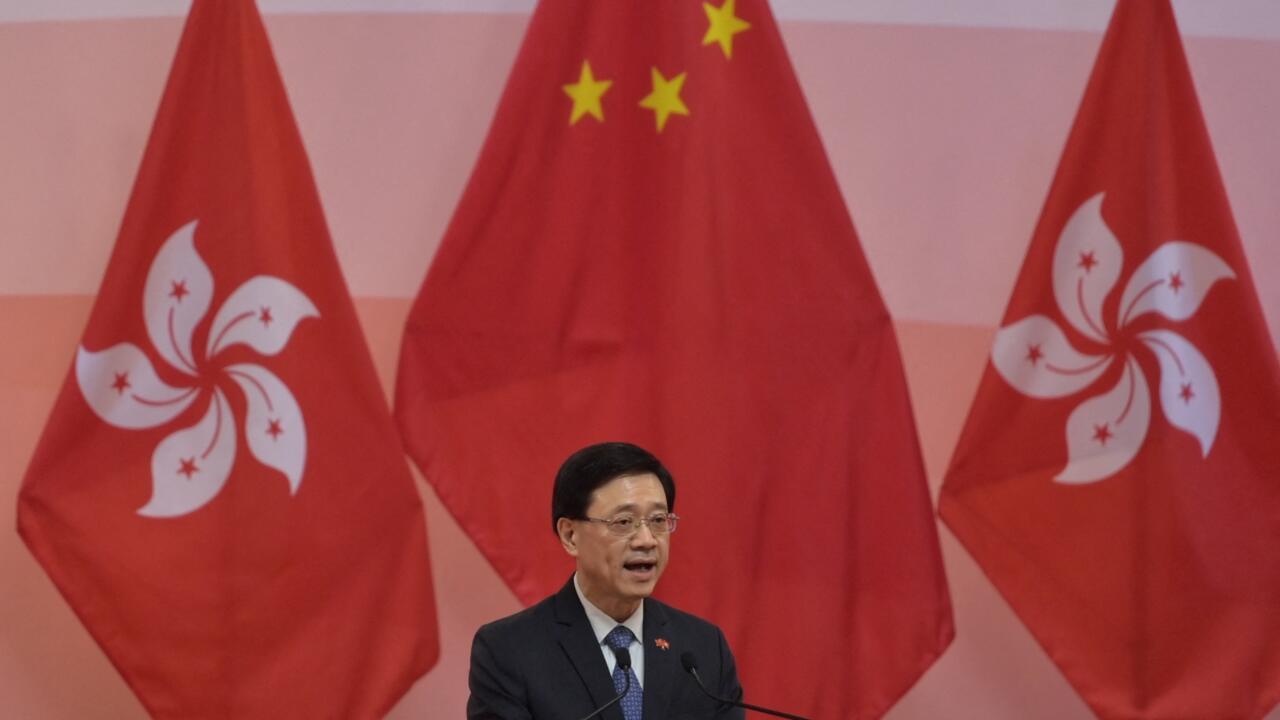Hong Kong (AFP) – As a former beat cop turned Hong Kong’s security chief, John Lee is the only person China’s leaders trust to run the city, as their trusted lieutenants, analysts and insiders say.
Lee, 64, is expected to be named chief executive of Hong Kong next Sunday by a small committee, the culmination of a choreographed run blessed by Beijing with no other candidates.
His rise caps a remarkable rise for a man whose police career took him from a working-class family to the upper echelons of Hong Kong’s political establishment.
It also puts a security official in the city’s top job for the first time, a man who played a key role in suppressing the huge democratic protests and subsequent political crackdown in Beijing.
Insiders say Lee’s unwavering commitment to the role won China’s trust at a time when other Hong Kong elites were seen as insufficiently loyal or competent.
“John Lee is the one the central government knows best because he was in constant contact and interaction with the mainland,” pro-establishment lawmaker and prominent businessman Michael Tien told AFP.
Lai Tung-kwok, Hong Kong’s security minister before Lee took the role, put it differently.
“He’s a man who has stood the test,” Lai told AFP. “If he really wants something done, he will do his best to overcome the obstacles.”
– ‘Platinum elevator’ –
Lee represents a stark departure from the four chief executives who have ruled Hong Kong since its 1997 return to Chinese rule – all former businessmen or civil servants.
Lee spent 35 years in the force before joining the government in 2012, followed by a rapid rise to the top via what local media dubbed “a platinum lift”.
But law and order remained his portfolio, serving in the Security Bureau and then leader before becoming the city’s number two official last year.
Chien-yu Shih, an expert on Chinese security issues at Taiwan’s National Defense and Security Research Institute, said he believed Beijing started paying attention to Lee after the 2019 democracy protests.
These huge and sometimes violent rallies have been a popular expression of Hong Kong residents’ anger at their lack of influence over the running of their city.
The protests organized by students, teachers, unions, doctors and even civil servants were among the largest Hong Kong had ever seen.
But the Chinese government has described the protests as a foreign-backed plot led by “terrorists”, a stance Lee has taken.
“Beijing has observed which political figure is willing to follow their narrative,” Shih said, adding that Chinese leaders are still wary of Hong Kong officials.
Rockets and long hair
Lee, a Catholic, grew up poor in Sham Shui Po – to this day one of Hong Kong’s most working-class neighborhoods – but made his way to an elite Jesuit-run boys’ school.
Peter Lai, a former banker and schoolmate, described him as a smart, fashionable teenager who had long hair and wore flared pants.

Lai said he believed his old friend would be a good leader for the town.
Another contemporary, who asked not to be named, was less complimentary, describing Lee as more of a dilettante who enjoyed “chasing girls and going to parties”.
Most of his contemporaries went to college, but Lee turned down an offer to study engineering to join the police.
He later told a pro-Beijing newspaper that he was motivated by bullying by neighborhood hooligans.
Two former classmates gave a more practical reason: the police offered a stable career to Lee and his pregnant wife Janet.
First son Gilbert was born shortly after graduation in 1978 while second son Jacky arrived six years later.
Lee hasn’t said much about his family and dodged questions about whether they still hold British citizenship, which he gave up when he joined the government.
Business acumen?
Given his security record, it seems unlikely that Lee – already sanctioned by the United States – will call off Beijing’s campaign against dissent.
Where he will enter less familiar territory is the business world, an area where Hong Kong is suffering.
Hong Kong, once a vibrant and multicultural business hub, has been isolated internationally during the pandemic as it adheres to Beijing’s strict zero-Covid strategy.
Former security chief Lai said he believed Lee had the “wisdom and faith” to balance China’s demands that the coronavirus be kept at bay with keeping the economy going.
He recalled how Lee’s nickname in the security office was “Yip Man”, the name of a famous Chinese kung fu master but also a Cantonese homophone for someone who “asks every page”.
Danny Lau, a small business association leader, said Lee was not an ideal candidate but would reserve judgement.
“I hope he can consider Hong Kong’s international competitiveness and won’t waste time making unnecessary laws for the city’s economy,” Lau told AFP.
But others say Lee’s appointment confirms that China is now putting Hong Kong’s political security ahead of trade and livelihood issues.
“In the past, China could compromise for certain economic benefits,” Charles Mok, a former pro-democracy lawmaker now living abroad, told AFP.
“But now it seems that Beijing wants its people to feel that the world is full of threats and it is only safe to stick closely to the (Communist) Party.”
© 2022 AFP

